Egil Skallagrimsson, Warrior Poet
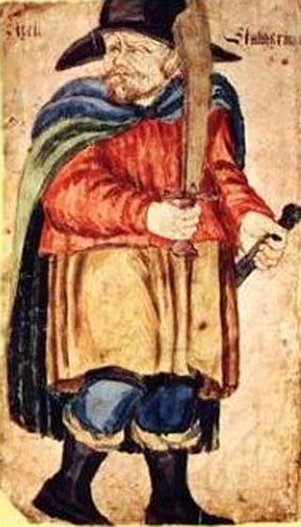
The story of Egil, the son of bald (”skalla”) Grimr, blurs the line between fact and legend. While we know he was a real person, the details of his life come to us from saga and song. Historians generally distrust oral traditions, as opposed to the written word – a ridiculous prejudice, really, as both are equally unreliable. Both are subject to the prejudices of the author, and all need to be taken with a pinch of salt. Yet even taking into account the propensity for exaggeration and self-aggrandisement in the sagas, Egil was an extraordinary person – and definitely not someone you’d want to meet in a fight.
Egil was born in Iceland to Norwegian settlers, his father Grimr having left Norway in a hurry after a family feud with the king ended with him killing a ship full of the king’s supporters, including two of his cousins. Like his father, Egil was uncommonly ugly in appearance, though his brother was very handsome. This was not uncommon in Grimr’s family, and people since have suspected (based on descriptions and bones that have been found) that the family carried the genetic disorder Paget’s Disease, which causes deformation of the bone structure as well as occasional mental derangements. Thick skulls and a tendency to berserk were not really a disadvantage in Viking days, though Egil had one unusual string to his bow. He was a poet, perhaps one of the greatest of the Viking poets, and it is said that he composed his first poem at the age of three. This was in praise of the host at a party he had sneaked into after his father had forbidden him from attending. [1] The poem was of such quality that his father decided not to punish him for his disobedience.
Another incident for Egil’s childhood points to a somewhat different side to his character. When he was six years old, he was playing a ball game with a child of ten named Grim. Not surprisingly, given the age difference, Grim was winning – and not being too gracious a winner either. Egil struck at Grim with his bat, but the older boy just laughed at him and threw him to the ground, where all the assembled children jeered at him. Egil went home in a fury, then returned with an axe and split Grim’s head open. This started a general battle that ended with seven men dead. Once again his father Grimr wasn’t too happy, though his mother was delighted. She declared that he had the makings of a true Viking, and started badgering his father to give him a ship of his own.
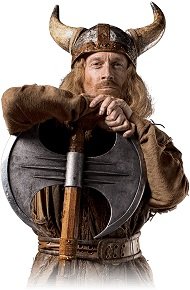
The King whom Grimr had feuded with died, and his son Eirik Bloodaxe had no wish to continue the feud, so the family were able to return to Norway. Matters remained tense, however, and Egil’s temperament rubbed a lot of people the wrong way. One of those was Bard, a kinsman of Queen Gunnhilda, who claimed to have no ale to give Egil and his men when they came to take shelter from a storm. In truth, he was hosting a banquet for the king and did not wish to share his supplies with the uninvited guests. Egil soon became boisterous and his noise disturbed the main feast, leading the queen and Bard to decide to mix poison in his drink to avenge the insults he was giving. Egil suspected something however, and according to the saga drew runes in blood on the cup, causing it to burst from the poison. He then attempted to leave, and when Bard tried to block his way, he stabbed and killed him. The king sent men in pursuit to arrest Egil, who had swam out to a nearby island, but when they arrived he killed several of them, stole their boat and escaped. He took refuge with a powerful warlord named Thorir, and through his intercession a weregild (a fine for the murder) was set and paid, so that Egil was no longer a criminal. Queen Gunnhilda, however, hated him ever after.
The next year Egil and his brother Thorolf went out raiding, as most Vikings did. They raided into Sweden, finding it easy pickings as most of the villagers would flee at the site of the dragon boats leaving their villages ready to be plundered. At one such village Egil and his band stayed too long, finding their path back to their boat cut off by a heavily armed force of soldiers. After a brief standoff they were captured. The villagers decided to keep them prisoner overnight so that their deaths the next day could provide a spectacle, which turned out to be a serious mistake. Egil, due to his strength, was tied to a post in his cell, but this simply gave him something to batter the wall down with once he’d uprooted it. He reunited with his men, along with a Danish merchant family who were being held for ransom by the townsfolk. The Danes knew the layout of the village well and were able to guide them safely and secretly first to the town’s treasury, which they looted, and then to the edge of town. As they made to depart Egil stopped. He declared that the adventure was decidedly un-warriorlike, and set off back in to town. The townsfolk were busy celebrating their victory over the raiders, so Egil set their longhouse on fire and then killed them all as they fled out of the exit. The story ended the way he wanted, he departed.
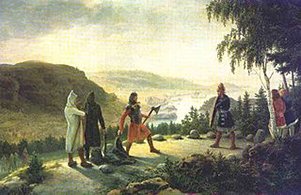
Egil and his brother worked for several years as mercenaries in England for warring Viking rulers there, until Thorolf died battling in Scotland. Egil decided to return to Norway in order to marry his widowed sister-in-law and take over his brother’s inheritance. He ran into a problem, however, as the royal family had not forgotten their grudge against him. The inheritance had to be ratified by the king but he (without any real legal justification) disallowed it and instead gave the lands to one of his supporters. Egil demanded a holmgang, a Viking duel to settle the matter, but it was denied. Enraged he denounced the whole proceedings and departed. The king led a force after him, seeking to kill him, and though they overwhelmed his ship and killed many of his men Egil escaped. He took refuge with Arinbjorn, the son of Thorir who had sheltered him before. In a raid he killed Bergonund, the supporter who had been given his lands, and in the same raid the king’s son Rognvald was killed. Egil was banished from Norway as an outlaw, and in revenge he set up a nithing-pole, a post with a horse’s head on it, as a curse on the king and queen. After that Egil returned home, where he and his father argued over the money that had been sent to Grimr in payment for Thorolf’s death butt which Egil had never delivered. In spite Grimr then took his portable treasure out into the woods and buried it, before returning home and dying. Egil buried his father in the traditional mound, but with no grave-goods, reasoning that those had been buried already. So it was that Egil inherited his father’s position as a warlord.
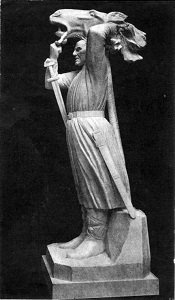
For a time Egil, like his father, took refuge in Iceland until one year when he was travelling to England and his ship ran into a storm. Wrecked on the coast, he headed to the nearby town of York. He was shocked to find that both Arnbjorn and Eirik were in the town, as Eirik had been ceded the province by King Aethelstan, Egil’s former employer. With no other option, Egil went to the town and spoke to Arnbjorn, then presented himself to the king. The queen (who was also there) urged that he should be killed immediately, but Arnbjorn reminded the king that “night-slaying is murder”. Egil was thus sent out to come back in the morning and face his fate. He and Arnbjorn talked, and remembered a tale of how Bragi Boddason, Arnbjorn’s ancestor and a famous skald, had turned the wrath of King Bjorn of Sweden by composing a poem in his praise in a single night. Egil decided to follow Bragi’s example, though he said that praising Eirik had been the last thing he’d panned on doing. Still, he laboured all night, and the next day he stepped into the court. To win over the man whose son he had killed, it would take something unprecedented, and that was what he had. During his travels in England he had learnt a new type of poetry, one that King Eirik had never before heard. Poetry that rhymed. The court sat, entranced, as he spoke the poem through to the final words:
“Silence I have broken,
A sovereign’s glory spoken:
Words I knew well-fitting
Warrior-council sitting.Praise from heart I bring,
Praise to honoured king:
Plain I sang and clear
Song that all could hear.”
The king was spellbound, and afterwards had no choice but to give Egil his life, and lift his outlaw status. Though he said it did not wipe away the vengeance, still the poem had left Egil his head, and so it is known as the “Head-Ransom” poem. Egil and his men were able to go in piece, and Egil and Arnbjorn confirmed their friendship with gifts, as Egil knew he owed his friend a great debt for standing by him.
Egil had the chance to repay his debt to Arnbjorn not long later, when he heard that Arnbjorn’s son Fridgeir had been forced into a holmgang with a Swedish berserker named Ljot the Pale. Ljot was an experienced and fearsome warrior who had demanded the hand of Arnbjorn’s daughter in marriage, and when Fridgeir had told him to take his attentions elsewhere, he had been challenged to the duel. Fridgeir was a brave lad but totally inexperienced, and the family were already mourning him. Egil volunteered to be his second. When Ljot appeared Egil started mocking him in poems, at which the angry Swede demanded to fight him rather than Fridgeir. Egil accepted with a poem, and continued to compose and recite insulting poetry as they fought. This naturally enraged Ljot even more, until Egil knocked aside his shield and cut off his leg. [2] As Ljot lay dying, Egil recited:
“Fallen lies the wolf-feeder,
Foul worker of mischief.
The bard lopped his leg off,
Leaving Fridgeir in peace.”
Egil’s greatest poem came from a tragic root, the death of his most beloved son Böðvarr not in battle, but from drowning. After Egil had buried his son he went into seclusion, refusing all food or drink and clearly intending to die. His wife sent for their daughter Thorgerd, who was his favourite child after the son who had died. She asked Egil to let her into the room, saying that she wished to join him in his fast. When she entered she was chewing seaweed, though when she offered him a piece he declined. She then said that chewing it had made her thirsty and sent for some water. When it arrived, she offered it to him first, and he took a great draught, finding to his annoyance that it was not water but milk. “They’ve tricked us,” cried his daughter. “Since you’re not going to die straight away now, why not write a poem for my dead brother Böðvarr? Since he didn’t die in battle, that’s the only way he’ll be remembered.” Egil agreed and began to write, and through putting his feelings into words gradually the fey spell left him and he decided not to die. The poem he wrote, Sonatorrek, is considered by some to be the finest of all Viking poems.
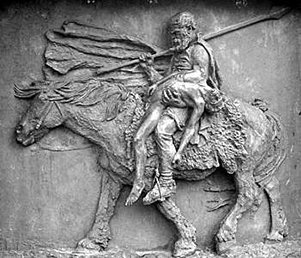
Egil’s prowess in battle doomed him to the worst fate imaginable for a proud Viking warrior – old age. In his final years he lived in the house of his niece and her husband, warming himself by the fire and lamenting his failing senses and impotence as he recalled past glories. One day he set off into the woods with a group of slaves and the two chests of silver he had argued with his father over so long ago. He returned alone, having buried the silver and killed the slaves to keep the secret. Shortly after, at the age of 80, he died. He remains a national hero in Iceland, with statues and even beers named after him. Though it was deeds in battle that he valued, it is his poetry that ensure that Egil lives on – murderous and boastful, prideful and strong-willed, with sharp words and sharper sword.
“The poem rises,
My labour is not lost,
Long may my words live. “
[1] His father forbade him because “You don’t know how to behave yourself when there’s company gathered and a lot of drinking going on. You’re difficult enough to cope with when you’re sober.” It’s worth repeating that Egil was only three years old at the time.
[2] A surprisingly common Viking death-blow, authenticated by the injuries archaeologists have found to bodies buried at the time.

The account of events is not very accurate and differs from that in Egilssaga. The incident with poisoned beer and runes carved upon a drinking horn occurred in Vermaland, Sweden, for example.